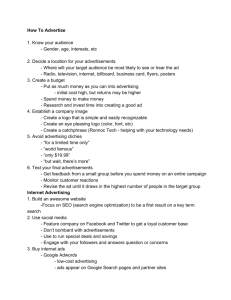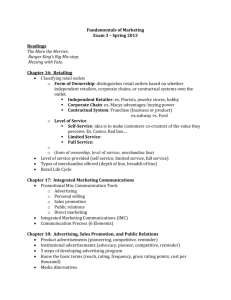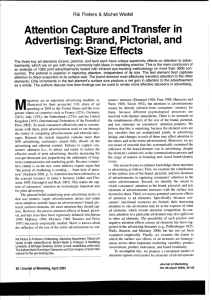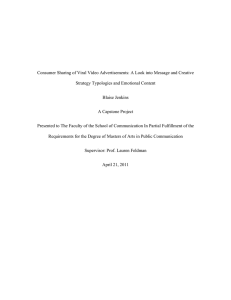Advertising and the Rights of Consumers
advertisement
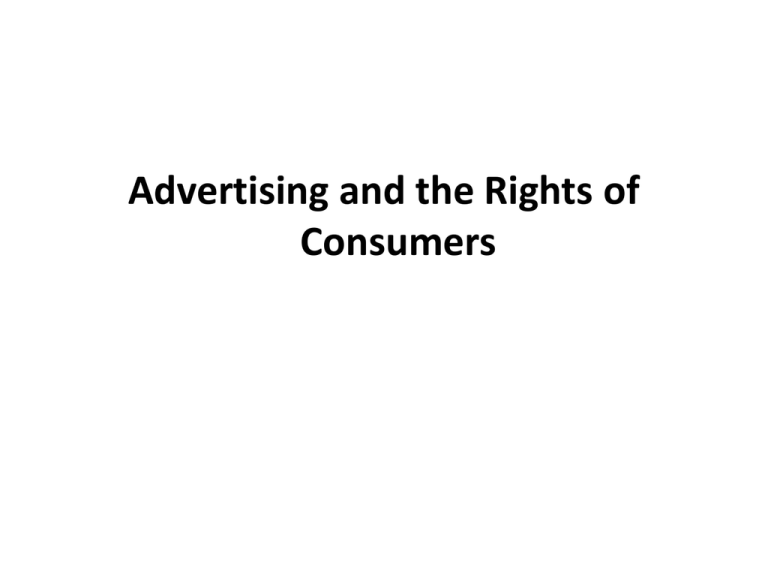
Advertising and the Rights of Consumers Advertising • Advertising – business whose main purpose is to persuade people to buy certain products or avail certain services. • Advertisement – process or a way of communicating to the consumer the benefits or advantages of using a particular product. • Advertisements increase profit because they create demand for a certain product; increase in demand increases profits. How Advertisements Create Demand • Four Ways to Sell a Product: – Personal Selling or direct selling – advertiser or agent tries to sell his product face to face with a consumer (e.g. real estate, insurance). – Advertising through mass media – radio, television, newspaper, billboards. – Advertising through the internet – company product web sites, email and others. – Attractive packaging – passive way of advertising product. How advertisements Create Demand: – Appealing to Consumer’s Emotion – emotional need such as love is used to woo buyers. – Bandwagon Effect – people buy because others buy. – Brand Names – when brand names are well known; brand loyalty – when consumers patronize a certain product carrying a particular brand because they believe it is a good product. Positive Effects • Gives important information about a product – know more about the product (labels and nutritional facts). • Saves time – consumers can just choose based on advertisements. • Increases product demand – consumers continue to buy the product. • Facilitates competition – more products become available giving consumer’s option. Negative Effects • Could Mislead the Public – some give false information. • Gets people to buy things they do not need – convince products that are not needed. • Increases the price of the product – advertising cost is part of the price of the product. Consumer Rights Safeguards that protect Consumer Rights: • Companies / Producers can set rules to protect consumers. • Government sets rules – Bureau of Trade Regulation and Consumer Protection (BTRCP), Bureau of Food and Drug (BFAD), Bureau of Product Standards (BPS) and DTI. • Private sector groups. Laws that protect Consumer Rights • Republic Act No. 7394 or Consumer Act of the Philippines – emphasizes protection and safety of consumers from false advertising and faulty production. • Republic Act No. 7042 or the Foreign Investment Act of 1991 – safeguard welfare of consumers and improve the quality of agricultural products. • Republic Act No. 3815 or the Revised Penal Code, Article 187 – punishment for selling products made of gold, silver and other previous metals. • Republic Act No. 386 or the Civil code of the Philippines, Article 2187 – responsibility of producers in the case of death, poisoning, or illness of a consumer caused by the use or intake of their products. Consumer Responsibilities • Primary responsibility of the consumers to be honest in their dealings with vendors of products they patronize. • Shoplifting – stealing products from a store. • False Claim – returning products that are already used and asking for a replacement or a refund on the pretenses that the product is defective or of low quality. Application of the Concept of Consumer Behavior Traffic Problems • Traffic becomes a problem because of the use of private vehicles rather than taking public transportation. Employment Problems • Contractualization – practice of employment where the capital or business owners hire workers on a labor-only contractual basis (i.e. their contract is subject to renewal on a regular basis). • Reasons for Contractualization: – Decreases their cost because no regular benefits are provided to the contractuals. – Employees seldom practice their right to organization and freedom of expression. Application of the Concept of Consumer Behavior Crime Problems • Fewer legitimate means of livelihood means more people engaging in illegal professions. Solving Social Problems (Mainline) • Traffic – increase parking and registration fees and increase number of public vehicles. • Employment Problem – law for benefits for contractual employees, air grievances from contractual employees. • Crime – wage law review; education and employment opportunities.
